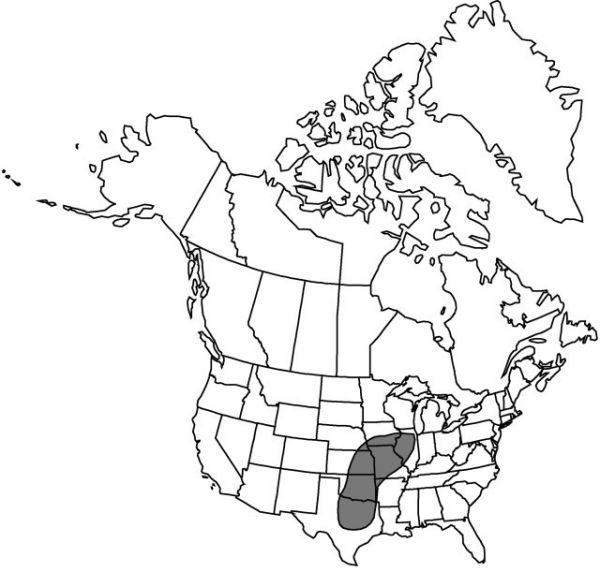Difference between revisions of "Erythronium mesochoreum"
Midland College Monthly 2: 5. 1891.
FNA>Volume Importer |
imported>Volume Importer |
||
| (6 intermediate revisions by 2 users not shown) | |||
| Line 8: | Line 8: | ||
}} | }} | ||
|common_names=Prairie trout-lily | |common_names=Prairie trout-lily | ||
| + | |special_status={{Treatment/ID/Special_status | ||
| + | |code=F | ||
| + | |label=Illustrated | ||
| + | }}{{Treatment/ID/Special_status | ||
| + | |code=E | ||
| + | |label=Endemic | ||
| + | }} | ||
|basionyms= | |basionyms= | ||
|synonyms={{Treatment/ID/Synonym | |synonyms={{Treatment/ID/Synonym | ||
|name=Erythronium albidum var. coloratum | |name=Erythronium albidum var. coloratum | ||
|authority=Sterns | |authority=Sterns | ||
| − | }}{{Treatment/ID/Synonym | + | |rank=variety |
| + | }} {{Treatment/ID/Synonym | ||
|name=Erythronium albidum var. mesochoreum | |name=Erythronium albidum var. mesochoreum | ||
|authority=(Knerr) Rickett | |authority=(Knerr) Rickett | ||
| + | |rank=variety | ||
}} | }} | ||
|hierarchy=Liliaceae;Erythronium;Erythronium mesochoreum | |hierarchy=Liliaceae;Erythronium;Erythronium mesochoreum | ||
| Line 30: | Line 39: | ||
|elevation=100–700 m | |elevation=100–700 m | ||
|distribution=Ark.;Ill.;Iowa;Kans.;Mo.;Nebr.;Okla.;Tex. | |distribution=Ark.;Ill.;Iowa;Kans.;Mo.;Nebr.;Okla.;Tex. | ||
| − | |discussion=<p>Because stolons are absent in Erythronium mesochoreum, most plants in a population produce flowers; nonflowering plants may sometimes appear after flowering plants have flowered. This species is well adapted to prairie fires. The seeds have elaiosomes, and ants may act as dispersal agents (Great Plains Flora Association 1986). C. C. Deam et al. (1941) reported E. mesochoreum from Indiana, but an examination of the specimens cited, now at IND, showed that these are E. albidum. E. L. Braun (1967) reported that many populations of E. albidum in southwestern Ohio indicate introgression with “the Ozarkean var. mesochoreum….” However, personal observation by K. R. Robertson of several Ohio populations in flower confirmed that these plants are true E. albidum, although they occur in prairies and have more or less conduplicate leaves.</p> | + | |discussion=<p>Because stolons are absent in <i>Erythronium mesochoreum</i>, most plants in a population produce flowers; nonflowering plants may sometimes appear after flowering plants have flowered. This species is well adapted to prairie fires. The seeds have elaiosomes, and ants may act as dispersal agents (Great Plains Flora Association 1986). C. C. Deam et al. (1941) reported <i>E. mesochoreum</i> from Indiana, but an examination of the specimens cited, now at IND, showed that these are <i>E. albidum</i>. E. L. Braun (1967) reported that many populations of <i>E. albidum</i> in southwestern Ohio indicate introgression with “the Ozarkean var. mesochoreum….” However, personal observation by K. R. Robertson of several Ohio populations in flower confirmed that these plants are true <i>E. albidum</i>, although they occur in prairies and have more or less conduplicate leaves.</p> |
|tables= | |tables= | ||
|references= | |references= | ||
| Line 39: | Line 48: | ||
-->{{#Taxon: | -->{{#Taxon: | ||
name=Erythronium mesochoreum | name=Erythronium mesochoreum | ||
| − | |||
|authority=Knerr | |authority=Knerr | ||
|rank=species | |rank=species | ||
| Line 53: | Line 61: | ||
|publication title=Midland College Monthly | |publication title=Midland College Monthly | ||
|publication year=1891 | |publication year=1891 | ||
| − | |special status= | + | |special status=Illustrated;Endemic |
| − | |source xml=https:// | + | |source xml=https://bitbucket.org/aafc-mbb/fna-data-curation/src/2e0870ddd59836b60bcf96646a41e87ea5a5943a/coarse_grained_fna_xml/V26/V26_276.xml |
|genus=Erythronium | |genus=Erythronium | ||
|species=Erythronium mesochoreum | |species=Erythronium mesochoreum | ||
Latest revision as of 21:14, 5 November 2020
Bulbs ovoid to ± globose, 10–25 mm; stolons absent; flowering plants reproducing vegetatively by droppers or offshoots. Leaves 5–14 cm; blade green, usually not mottled, elliptic-lanceolate to ovate-lanceolate, conduplicate, glaucous, base and margins sometimes purple-brown, margins even. Scape 5–15 cm. Inflorescences 1-flowered. Flowers: tepals spreading at anthesis, white, tinged pink, blue, or lavender abaxially, with yellow adaxial spot at base, lanceolate, 15–30 mm, auricles absent; stamens 8–15 mm; filaments yellow, lanceolate; anthers yellow; pollen yellow; style white, 7–10 mm; stigma lobes recurving, 1–1.5 mm. Capsules resting on ground at maturity due to reclining peduncle, obovoid, 10–15 mm, apex rounded to faintly apiculate or umbilicate. 2n = 22.
Phenology: Flowering spring.
Habitat: Prairies, glades, dry, open woods, occasionally pastures
Elevation: 100–700 m
Distribution

Ark., Ill., Iowa, Kans., Mo., Nebr., Okla., Tex.
Discussion
Because stolons are absent in Erythronium mesochoreum, most plants in a population produce flowers; nonflowering plants may sometimes appear after flowering plants have flowered. This species is well adapted to prairie fires. The seeds have elaiosomes, and ants may act as dispersal agents (Great Plains Flora Association 1986). C. C. Deam et al. (1941) reported E. mesochoreum from Indiana, but an examination of the specimens cited, now at IND, showed that these are E. albidum. E. L. Braun (1967) reported that many populations of E. albidum in southwestern Ohio indicate introgression with “the Ozarkean var. mesochoreum….” However, personal observation by K. R. Robertson of several Ohio populations in flower confirmed that these plants are true E. albidum, although they occur in prairies and have more or less conduplicate leaves.
Selected References
None.